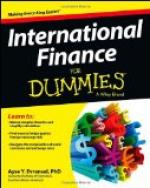In the eighteenth century a great outburst of gambling in the East Indian and South Sea companies, and a horde of less notorious concerns was a short-lived episode which must have helped for a very long time to strengthen the natural prejudice that investors feel in favour of putting their money into enterprise at home; and it was still further strengthened by the disastrous results of another great plague of bad foreign securities that smote London just after the war that ended at Waterloo. This prejudice survived up to within living memory, and I have heard myself old-fashioned stockbrokers maintain that, after all, there was no investment like Home Rails, because investors could always go and look at their property, which could not run away. Gradually, however, the habit of foreign investment grew, under the influence of the higher rates of interest and profit offered by new countries, the greater political stability that was developed in them, and political apprehensions at home. In fact it grew so fast and so lustily that there came a time, not many years ago, when investments at home were under a cloud, and many clients, when asking their brokers where and how to place their savings, stipulated that they must be put somewhere abroad.
This was at a time when Mr. Lloyd George’s financial measures were arousing resentment and fear among the investing classes, and when preachers of the Tariff Reform creed were laying so much stress on our “dying industries” that they were frightening those who trusted them into the belief that the sun was setting on our industrial greatness. The effect of this belief was to bring down the prices of home securities, and to raise those of other countries, as investors changed from the former into the latter.
So the theory that we were industrially and financially doomed got another argument from its own effects, and its missionaries were able to point to the fall in Consols and the relative steadiness of foreign and colonial securities which their own preaching had brought about, as fresh evidence of its truth. At the same time fear of Socialistic legislation at home had the humorous result of making British investors fear to touch Consols, but rush eagerly to buy the securities of Colonial Governments which had gone much further in the direction of Socialism than we had. Those were great days for all who handled the machinery of oversea investment and in the last




